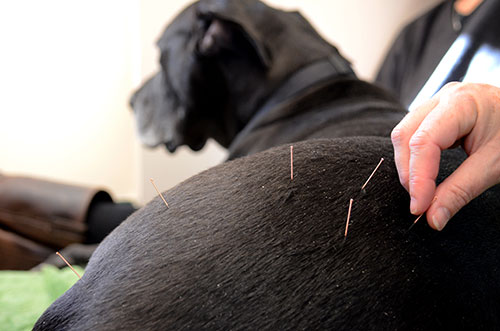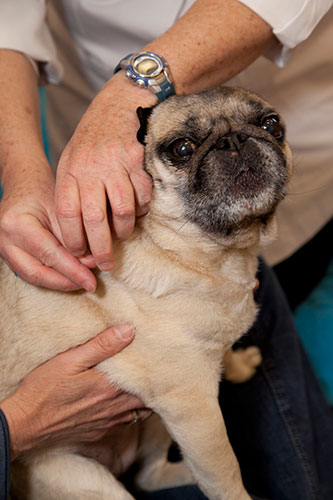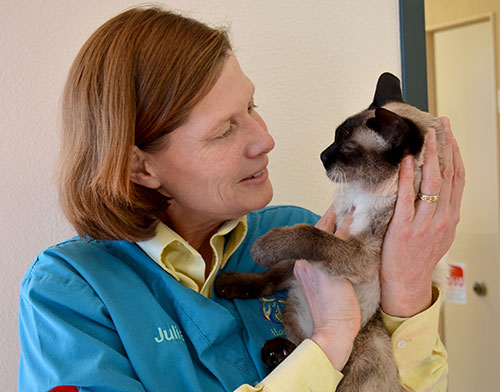What is Acupuncture?

Acupuncture involves placing small flexible needles into specific points on the body, called acupoints, to treat illness and disease. It originally evolved three to four thousand years ago in India and China, and was the main form of medicine in China until the 1900s. In the early 1970s, veterinarians from the U.S. brought the treatment here for use in their animal patients. While acupuncture therapy is still evolving, there are now many scientific studies to support its effectiveness in humans and animals.
How does Acupuncture work?
There are two approaches to understanding the effects of acupuncture. Western studies have shown that acupuncture produces a release of endorphins (the body’s natural morphine), which help alleviate pain. We also know acupuncture causes the release of other substances (such as cortisol), changes blood flow in the areas around the needles, and potentially acts on “inhibitory” neurons, which are nerve cells in the spinal cord that can inhibit the transmission of pain to the brain.
Eastern philosophy believes that vital energy, or chi, flows through the body in specific channels called meridians. Obstruction of the flow of energy from external forces (such as wind, heat, dampness, and other “pathogenic factors”) results in disease symptoms such as pain. Acupuncture needles are used to tap into specific points along these energy channels to relieve the obstruction and restore the energy balance of the body.
Does Acupuncture hurt?
Acupuncture is not painful. The needles are much smaller and thinner than those used for routine shots and injections. There is a minimal pinching sensation when the needles are inserted through the skin. Occasionally, there is a sore spot that will be more sensitive to needle placement.
Can you do Acupuncture on animals?
Yes! Acupuncture is a very effective treatment for many ailments in animals. Most pets tolerate needle insertion quite well. Dogs and cats who undergo an acupuncture treatment must hold relatively still for about 20 minutes, and the majority of pets do well laying on a blanket while being petted by their owners. We also offer treats and other “bribes” to keep them calm. Many pets look forward to and enjoy the treatment, some actually fall asleep.
What kind of conditions respond to Acupuncture?
Acupuncture works well for many different conditions in animals, including:

- Arthritis and other joint problems
- Neurologic problems (nerve injury, ruptured discs, seizures)
- Pain management
- Digestive disorders
- Constipation in dogs and cats
- Inflammatory bowel disease in dogs and cats
- Feline asthma
- Wound healing and scar reduction
- Post-operative pain management
- Immune system disorders
Will Acupuncture cure my pet?
The effect of acupuncture varies in individual patients, just like any drug treatment in Western medicine. About 85 percent of patients with arthritis improve with acupuncture, showing an increase in activity, a decrease in lameness or other signs of pain, and a decreased need for other treatments and medication. Acupuncture will not reverse the damage of arthritis and other diseases, but it can offer increased comfort and improved quality of life.
How long does an Acupuncture treatment take?
The first acupuncture treatment takes about an hour, as a full medical history and physical exam of your pet are completed prior to performing the acupuncture. Subsequent treatments take about 30 to 40 minutes.
How soon will I see a response to Acupuncture?
Again, this will vary with the individual, but most animals will respond within the first three to four treatments. Chronic diseases generally take longer to improve than acute diseases. The general guideline is that if a patient hasn’t responded after the fourth treatment, a different therapy should be implemented.
How long will the response to Acupuncture last?
The effects of acupuncture are cumulative, so the initial response may last only hours or a few days. Later treatments result in much longer responses, up to several weeks or months. Again, this varies in individual animals depending on the severity of disease.
How often will my pet need Acupuncture treatments?
Pets generally receive acupuncture treatments weekly until improvement is seen. Then the treatments are stretched out to every other week, then every three weeks, and so on. Most pets end up on monthly maintenance therapy. For acute conditions, acupuncture may be discontinued once the symptoms are resolved.
Is Acupuncture safe?
Acupuncture is considered very safe, especially when compared with the side effects of most pharmaceuticals. However, there are a few potential complications:
- Infection at the site of needle placement. Because of the needles’ very small size, this is a very rare occurrence.
- Broken needles. Again, because the needles are flexible they tend to bend rather than break, but broken needles have been reported, especially in horses.
- Ingestion of a needle. The occasional patient will mistake a needle for food and eat it. Usually the needle passes without incident. However, we can also retrieve the needle if necessary.
- Worsening of symptoms. While acupuncture is supposed to make animals better, a treatment can occasionally make a patient’s symptoms worse. This is because the acupuncture treatment is opening blood flow and energy flow to an area that has been deprived for a period of time. The perception of pain increases in response to this new flow, but the effect is transient, usually only lasting 24 to 48 hours before improvement is noted.
Can I stop the medications my pet is currently taking?
Without a doubt, one of the goals of acupuncture is to minimize or discontinue use of potentially harmful drugs. However, you should never stop medications your pet is currently taking without consulting your veterinarian. Suddenly stopping medication can result in new, serious problems. You should discuss all medications and supplements with your regular veterinarian as well as with your veterinary acupuncturist. In many cases, only a combination of therapies, such as acupuncture, anti-inflammatory drugs, and rehabilitation will keep the patient comfortable.
Medical Qigong

Medical Qigong is the oldest of the four main branches in Traditional Chinese Medicine (TCM) which include acupuncture, herbal medicine, and massage. Pronounce “chee” (Qi) “gung” (gong), Medical Qigong is a comprehensive system based on differential TCM diagnostics that cultivates the vital energy of the patient to improve or restore overall health.
Medical Qigong is an excellent adjunct to western medicine. Therapy consists of a series of energetic treatments by a trained practitioner to regulate the patient’s qi (vital energy). The aim of a qigong treatment is to correct the bio-energetic imbalances, or blockages, in the patient’s system so as to strengthen and regulate internal organs, the nervous and immune systems, ease emotions or anxiety, and relieve pain.
In China, Medical Qigong is a complete medical system within itself. However, in the West, Medical Qigong seeks to support the care provided by veterinarians and veterinary acupuncturists. It is very effective in supporting animals with cancer, those undergoing surgery, seizure patients, animals with chronic pain disorders and conditions effecting the nervous and immune systems, including emotional disorders like anxiety.
If your pet is adverse to acupuncture, Medical Qigong is an excellent option to consider. It can be delivered without touch, with a subtle touch, or through vigorous qi massage depending on the sensitivities of the patient. Medical Qigong works with the same meridian lines and points as acupuncture without needles, allowing the body to balance itself for optimal health.
Often the Medical Qigong practitioner will teach home care exercises to help deliver long term and lasting results. A positive benefit of many of these home exercises is the life enhancing effect it has on the patient’s human companion’s quality of life, resulting in a deeper human- animal bond and generally a more relaxed state of being.
Our veterinarians and Medical Qigong practitioner will help you assess if this modality is suitable for your pet.
